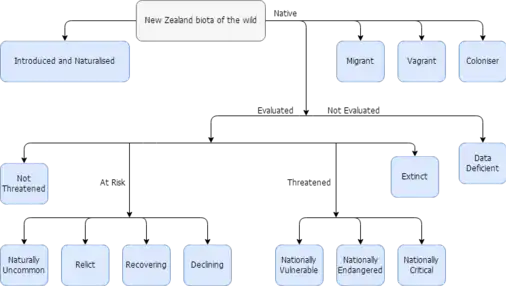New Zealand Threat Classification System
The New Zealand Threat Classification System is used by the Department of Conservation to assess conservation priorities of species in New Zealand.[1]
The system was developed because the IUCN Red List, a similar conservation status system, had some shortcomings for the unique requirements of conservation ranking in New Zealand. As of 2011, plants, animals, and fungi are evaluated, though the lattermost has yet to be published.[2] Algae were assessed in 2005 but not reassessed since.[2] Other protists have not been evaluated.[2]
Categories

The structure of the New Zealand Threat Classification System (2007 revision).
Species that are ranked are assigned categories:[3]
- Threatened
- This category has three major divisions:
- Nationally Critical - equivalent to the IUCN category of Critically endangered
- Nationally Endangered - equivalent to the IUCN category of Endangered
- Nationally Vulnerable - equivalent to the IUCN category of Vulnerable
- At Risk
- This has four categories:
- Declining
- Recovering
- Relict
- Naturally Uncommon
Other categories
- Introduced and Naturalised
- These are any species that are deliberately or accidentally introduced into New Zealand.
- Migrant
- Migrant species are those that visit New Zealand as part of their life cycle.
- Vagrant
- Vagrants are taxa that are rare in New Zealand that have made their own way and do not breed successfully.
- Coloniser
- These taxa have arrived in New Zealand without human help and reproduce successfully.
- Data Deficient
- This category lists taxa for which insufficient information is available to make as assessment on conservation status.
- Extinct
- Taxa for which there is no reasonable doubt that no individuals exist are ranked as extinct. For these lists only species that have become extinct since 1840 are listed.
- Not Threatened
- If taxa fit into none of the other categories they are listed in the Not Threatened category.
Qualifiers
A series of qualifiers are used to give additional information on the threat classification:[1][3]
| Qualifier | Definition | |
|---|---|---|
| CD | Conservation Dependent | Likely to move to a higher threat category if current management ceases |
| DP | Data Poor | Confidence in the listing is low due to the poor data available for assessment |
| De | Designated | The criteria does not completely apply to the taxa |
| EW | Extinct in the Wild | Exists only in cultivation or in captivity |
| EF | Extreme Fluctuations | Extreme unnatural population fluctuations, or natural fluctuations overlaying human-induced declines, that increase the threat of extinction |
| Inc | Increasing | Population thought to increase 10% over 3 generations or 10 years |
| IE | Island Endemic | Endemic only to a single archipelago and not the main islands |
| OL | One Location | Found at one location (geographically or ecologically distinct area) in which a single event (such as a predator irruption) could soon affect all individuals of the taxon |
| PD | Partial Decline | Taxa has one or more secure populations but otherwise is declining |
| RR | Range Restricted | taxa confined to less than 1,000 km2 (390 sq mi) |
| RF | Recruitment Failure | Current population may appear stable but the age structure is such that catastrophic declines are likely in the future |
| SO | Secure Overseas | Secure in other parts of its natural range outside New Zealand |
| Sp | Sparse | Taxa in small, scattered populations |
| ST | Stable | Total population stable |
| TO | Threatened Overseas | Threatened in those parts of its natural range outside New Zealand |
See also
References
- Molloy, Janice; Bell, B.; Clout, M.; de Lange, P.; Gibbs, G.; Given, D.; Norton, D.; Smith, N.; Stephens, T. (2002). "Classifying species according to threat of extinction. A system for New Zealand" (PDF). Department of Conservation (New Zealand). Retrieved 2008-02-29.
- Hitchmough, Rod (June 2013). Summary of changes to the conservation status of taxa in the 2008–11 New Zealand Threat Classification System listing cycle (PDF). Wellington, NZ: Publishing Team, Department of Conservation. ISBN 9780478149869. ISSN 2324-1713. Retrieved 2 February 2018.
- Townsend, Andrew J.; de Lange, Peter J.; Duffy, Clinton A.J.; Miskelly, Colin M.; Molloy, Janice; Norton, David A. (January 2008). New Zealand Threat Classification System manual (PDF). Wellington, New Zealand: Science & Technical Publishing Department of Conservation. ISBN 9780478143645. Retrieved 2 February 2018.
External links
This article is issued from Wikipedia. The text is licensed under Creative Commons - Attribution - Sharealike. Additional terms may apply for the media files.